Thirteen months after Chicago Tribune managing editor Jim Warren gave Michael Phillips the job of senior film critic and downgraded the venerated Michael Wilmington to a second-string position, Wilmington has apparently resigned. Some kind of contractual go-away, buy-out deal. I know not why.
Departures of major writers are always political, but was this a budgetary matter? Another sign of a weakened newspaper in the face of internet encroachment? Or a personal decision on Wilmington’s part to head for some greener pasture? I don’t know the particulars, but Wilmington is the latest addition to a growing list of credentialed boomer-generation film critics — sharp, highly knowledgable cineastes who got their start in the Pauline Kael-dominated ’70s and ’80s — who’ve left their positions at big-time papers. Wilmington’s a good man, knows his stuff, deserves a berth or a book deal.
“This is goodbye and thanks to the people with whom I’ve worked for the last 14 years,” Wilmington wrote his colleauges a few days ago. “I’m leaving the Tribune, and I’ll relax a little before starting some writing projects I’ve put off for too long. I’ve appreciated the privilege of using the Tribune‘s pages to tell people about movies good and bad. I’ve also appreciated the vibrant Chicago film culture and audience that always made my work a pleasure.”
wired
Telegraph on Michael Bay
“It’s no wonder that Michael Bay is gun-shy,” a 7.22 Telegraph profile observes. “Newsweek has said he embodies ‘Hollywood’s capitulation to mindless, meaningless razzle-dazzle — a poster boy for the death of cinema.’
“The New York Times described Bad Boys as ‘stitched together, like some cinematic Frankenstein’s monster, from the body parts of other movies’. In a recent episode of Entourage, the mention of Bay’s name as the director of the main character’s next film drew on-screen groans, the implication being that even fictional creations don’t want to work with him.”
“Matt Stone and Trey Parker, the creators of South Park, have made a running gag of deriding Bay, starting a song in their film Team America with the line, ‘I miss you more than Michael Bay missed the mark when he made Pearl Harbor‘ and having a character quip in one episode of their cartoon series, ‘Job has all his children killed, and Michael Bay gets to keep making movies? There isn’t a god.'”
“Playboy” Without Music
Playboy, the Hugh Hefner biopic that Brett Ratner is supposed to direct sometime soon (next year?), is being scripted by John Hoffman, who most recently wrote Queen of the Jews, a piece about former Miss America Bess Myerson that Bill Condon will direct.
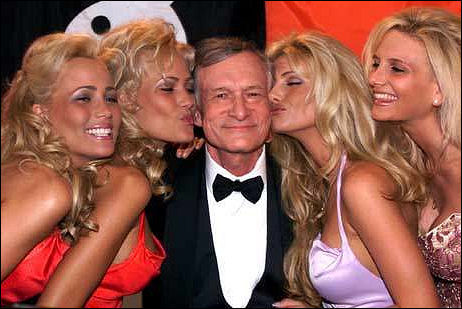
This presumably means that the musical biopic approach — first attempted by 8 Mile screenwriter Scott Silver — is out the window. Hoffman’s rewrite is reportedly being penned right now. Late last month Variety‘s Michael Fleming wrote that Ratner and Hoffman found a way to [tell Hefner’s story] that pleased [producer Brian] Grazer and the 81-year- old Hefner…in a meeting at the Playboy Mansion [in mid to late June].”
This is probably for the best. Attempting any kind of musical would be a stretch for a guy of Ratner’s interests and abilities. But two days ago someone slipped me Steve Baigelman‘s rewrite of Silver’s musical version, and a fairly recent one at that with a stamp that says “received by Imagine story dept.” on “Feb. 02, 2007.” And I was kind of wowed. Sink or swim, success or failure, this would be a real movie.
It’s a crazy screenplay, all right — a surreal dreamscape thing that would be more suited to a guy like Terry Gilliam — but it’s also smart, imaginative and out-there. It uses the notion of music and dance as a metaphor for the heady hormonal tonic of sexual liberal-ization in the 1950s and ’60s, when Hefner’s Playboy magazine became a symbol of the loosening of the repressed puritan ethos that America lived under until the first tremors happened in the late ’40s and early ’50s.

Okay, it may have been deemed too crazy but at least it’s up to something fairly bold and brassy — a kind of All That Jazz mixed in with a little Pennies From Heaven seasoning, a touch of The Purple Rose of Cairo and a sprinkling of Charles Dickens‘ “A Christmas Carol.”
It starts in 1985 — the year that Hefner had a stroke that led to a curbing of his houndish pursuits and a general reevaluation of his life. A 59 year-old Hefner is hosting a huge Playboy mansion party and yet — the entire movie essentially happens inside his head — feeling a little empty and sardonic, singing “Is That All There Is?,” the Peggy Lee standard.
He’s then startled to see a 26 year-old version of himself talking to one of his girlfriends. Old Hef and young Hef talk their life over (the latter assuming the upper hand), and from there the younger Hef takes us on a song-and-dance tour of Hef’s formative years in Chicago — his repressed childhood, living with his wife Mildred in his parents’ home, a fledgling cartoonist, a frustrating life as a copywriter, spending $9000 to publish the first issue of Playboy in 1953 (i.e., the one with Marilyn Monroe‘s nude calendar pix).
It starts to fast-forward around the two-thirds mark, shooting through the ’60s, ’70s and ’80s. It then moves past ’85 and into the present, ending with an 80 year-old Hef and replay of “Is That All There Is”?
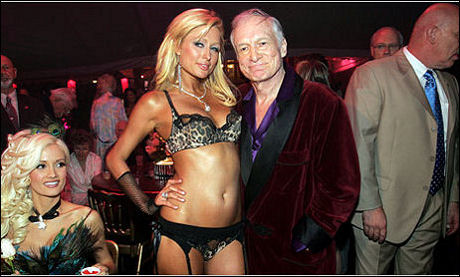
All of the songs in Baigelman’s script are several decades old — mostly background music for the World War II generation. “Witchcraft” (Frank Sinatra), “Got The Moon In My Pocket, Got a Dream Up My Sleeve”, “I Never Knew Heaven Could Speak”, “Nasty Man” “All The Way” (Sinatra makeout song), “Fool That I Am, For Thinking You Loved Me Too”, “You’ve Got to Accentuate The Positive”, “As Time Goes By” and “Pennies From Heaven.” There are two boomer cuts — “And When I Die” (Blood, Sweat and Tears) and “I Got lIfe” (from Hair), plus Prince’s “1999” and Edgar Winter‘s “C’mon and Take a Free Ride.”
Hoffman’s non-musical version will either be a linear biopic (i.e., a boilerplate “this happened, and then this happened, and then this happened” approach). Or some kind of time-flipping, 8 and 1/2-ish, Hefner-looking-back movie — i.e, the Baigelman musical screenplay without songs. Or something else I’m not seeing.
For a few hours there (i.e., before I re-read the trade stories about the Hoffman rewrite), I thought Ratner might actually be planning to direct the Baigelman. That would have been one hell of a move. My respect for Ratner shot up several notches. Then I realized it’ll be something else. I wrote and called Ratner this morning to make sure the Hoffman version will be music-free, but no reply…yet.
Sunday numbers
I Now Pronounce You Chuck and Larry dipped 5% from Friday to Saturday, but the expected Sunday night tally will nonetheless be about $34,775,000, which will make it the weekend winner. Harry Potter and the Order of the Pheonix will be a close second with a projected $33,209,000. And Hairspray was off 15% from Friday to Saturday, and is now looking at a weekend total of $28,729,000 instead of Saturday morning’s projected figure of $30,367,000. How much of the general Saturday falloff was due to the much-discussed coast-to-coast cocooning of Harry Potter fans reading the latest novel (“Harry Potter and the Deathly Hallows”) all day yesterday?
Blonsky meets Corcoran
Besides being a great singer, Hairspray star Nikki Blonsky seems pretty inside and out — a woman of buoyant spirit with sparkly eyes and an intoxicating smile. And in Monica Corcoran‘s 7.22 N.Y. Times profile of Blonsky, it is said that “this native of Great Neck, N.Y., has yet to develop starlet tendencies. She doesn’t twirl her hair or carry a lap dog.” And “when plates of ribs and roast chicken arrived” during a recent sit-down with Blonsky at a recent Queen Latifah concert at the Hollywood Bowl, “she dug in with gusto.”
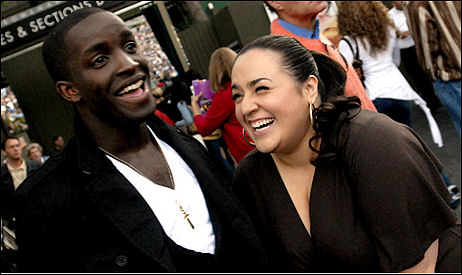
Hairspray costars Elijah Kelley and Nikki Blonsky
Some people feel that life without gusto simply isn’t living. The more gusto, the better. Gusto would make a pretty catchy brand name for foods, come to think. Gusto whipped cream, Gusto chocolate syrup, Gusto cheese doodles. There’s just something rich and life-affirming about that word. I don’t think it necessarily means “ordering plates with huge helpings.” I just think it means living life to the fullest.
Wait…does Corcorcan mean something by using the word “gusto”? Let’s see….she also writes that “to see Ms. Blonsky caper through Hairspray, the musical adaptation of the John Waters camp classic, is to watch a Botero come to life as she wiggles her broad backside and flaps her ample arms.” “Flaps”?
Bambi II vs. Bambi
Now here’s a guy — Slate‘s Dan Kois — who thinks for himself and stands his ground. No go-alonger, he! The articles’s about how Disney’s Bambi II (i.e., one of those animated sequels-to-classics that everyone loks down upon) is better than the original.
“Ultimatum” review
I can’t decide which adjectives or catch phrases to use in this review of Paul Greengrass ‘s The Bourne Ultimatum (Universal, 8.3). I’m really kinda stuck. Pulse-pounding, edge-of-your-seat, bobsled, warp-speed, heart-in-your-throat…how many hundreds of times have I read those terms? It’s gotten so they don’t mean very much. But this final Bourne flick does, I feel, “mean” something. That is, apart from the fact that all I could say for the first five or ten minutes after coming out of last night’s screening was “whoa” and “wow.”
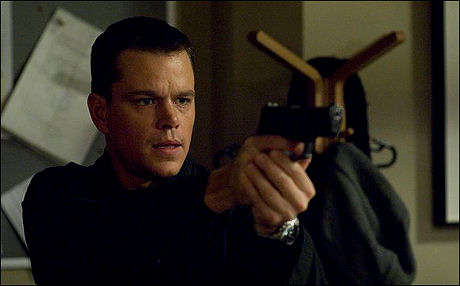
The Bourne Ultimatum is, naturally, one steriod orgasm action blast after another, but that’s expected. What else could it be with those two super-Bourne‘s before it? So let’s try and quantify. I think it’s an action movie milestone in two ways. One, by pushing the velocity-junkie aesthetic to new super-pleasurable extremes. And two, by being so good at this go-fast game that you don’t care that those hallowed dramatic substances — character brushstrokes, echoes, deep-down emotion, dialogue that addresses something besides story points. — are all but absent. You just don’t care. You’re in adrenaline heaven.
The best analogy I can think of is William Friedkin‘s subway-chase sequence in The French Connection, which lasted…what?…12 or 13 minutes? The Bourne Ultimatum runs 111 minutes and it has, at the most, 12 or 13 minutes of down time. The basic action-movie manual says you’re supposed to let the audience catch a breath between “musical numbers.” Ultimatum has a few of these, short ones, but they’re all assessment scenes about what just happened or what may be coming ’round the bend. You never feel as if Greengrass is downshifting to any serious degree (i.e., no sensitive love scenes, no “I’m tired and I need to sleep,” no talking softly while cooking in the kitchen).
Think of the three Bourne movies as high performance engines. Doug Liman‘s The Bourne Indentity (’02) had a few moments that took place in first and second gear, and one or two (the love scenes between Matt Damon and Franka Potente) in neutral. Greengrass’s The Bourne Supremacy (’04) was a serious increase experiment — a major pedal-tromp, cut-faster, crazy-legs thing — but even that film had moments of relative calm when emotion was given a little room to spread out (i.e., the death of Potente, the remorse scene in Moscow at the end). But Ultima- tum is even more high-octane than this. Everything, it seems, is flying in third, fourth and fifth gear. Not a single neutral moment…not one.
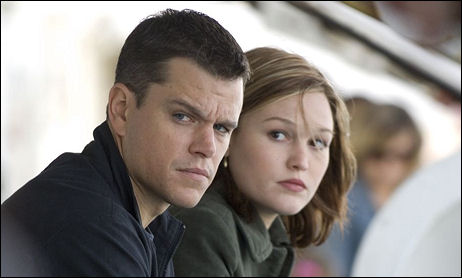
When I lean forward in my seat during a film it usually means I’m in pain. At last night’s screening I was leaning forward but without my hand covering the lower half of my face — a significant thing. I was in one of those “holy shit, am I going to be able to keep up with this?” modes. It was like driving at high speed and being afraid to take your eyes off the road. A friend tapped me on the shoulder during the third act (i.e., the New York portion) to share a quick observation, but I reflexively flinched and indicated with my hands that I couldn’t talk, not then, not even for five seconds…good God.
I was bitching after the second Bourne about Greengrass’s overly-fast editing during three or four action scenes. There’s a point at which hyper-cutting can be too much, but for whatever reason I was cool with it this time. Was there a different aesthetic this time? Was there an editing-room motto that said “no cuts longer than two seconds” on Supremacy and one that said “no cuts longer than three seconds” on this new one? I don’t know. I wasn’t carrying a stop-watch.
There was one moment when I realized Damon was no longer in London, but in Madrid. There had been nothing that said “travel” or “cultural transition”…he was just suddenly there. Nor is there any footage given to his flight from Europe to New York City. No getting to or coming back from airports, no taxis, no jet lag…none of that. It’s all hammer-hammer-hammer.
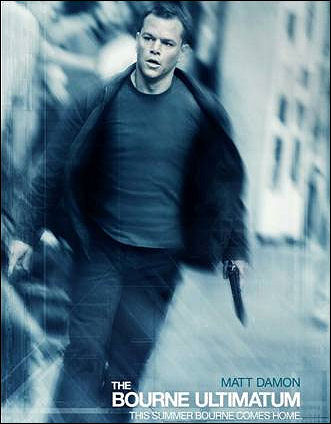
I’ve written dozens of times about hating action movies in which the hero is unstoppable, unwoundable, unkillable. Damon’s Jason Bourne is all these things and more. He’s a damn cyborg — no eating, no sleeping, no stopping for anything — and I loved it. And yet if I see some lower-level action star do the same thing in some run-of-the-mill B movie two weeks from now, I’m probably going to hate it. Why? The Bourne Ultimatum is coming from a high-thread-count, ahead-of- the-curve place that I hadn’t quite tasted or imagined before last night. It’s an action movie for people who think they’re too sophisticated to enjoy them.
When Damon took out three guys in a first-act scene set in London’s Waterloo station, I didn’t cringe for a second at the improbability of such a move. I loved it, the audience loved it and we all clapped. I imagined the bad guys (i.e., young grunt-level assassins) as being in the employ of Dick Cheney and all the other black-heart D.C. hardballers, and seeing them get beaten and out-maneuvered time and again is a joyous thing.
The triumph of Jason Bourne in this film is, no lie, a triumph of humanism. Bourne is not a sadist or even a killer as much as a survivor. The movie is not about killing villains as much as shaming them — making them fail so badly and so repeatedly that they have no choice at the end but to go to jail, give up or re-think their game.
There’s a hand-to-hand combat scene in Tangier between Damon and a contract assassin named “Desh” (Joey Ansah) that’s an instant classic. It’s right up there with Sean Connery‘s fight to the death with Robert Shaw in the train compart- ment in From Russia With Love. Above and beyond it, I’d say. I’m trying to think of others in this class.
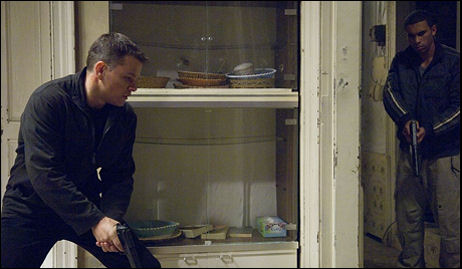
Each and every computer works perfectly in this film, and everyone has light-speed broadband. Each and every cell-phone video transmission and upload works every time. Technology is perfect, dazzling and awesome at every step. The Bourne Ultimatum is a fantasy film.
There are lines every now and then that sound a little flat, a little pulpy…but I wouldn’t call them speed bumps. The only thing I really didn’t care for is a bit in which (I need to be careful here, can’t say when it happens) a simulation of a certain state of being is offered for several seconds, and is then reneged upon just so Greengrass can go “fake out!” It’s a cheat, a schmuck move.
I could do the whole plot recitation thing and congratulate all the actors for being note-perfect…okay, I’ll do that. Damon is The Man, and I’m really, really sorry that he’s declared that this is the final Bourne. He is so much more “the guy” than Daniel Craig, and I’m fine with Craig. Cheers to Joan Allen, Julia Stiles (especially good in her one-on-one scenes with Damon), David Strathairn, Scott Glenn, Paddy Considine, Edgar Ramirez and the dozens of other actors who make it all seem sharp and true.
A crisp salute to screenwriters Tony Gilroy, Scott Burns and George Nolfi, and a deep bow of respect to cinematographer Oliver Wood, editor Christopher Rouse, composer John Powell, production designer Peter Wenham. The biggest tip of the hat goes to Greengrass, of course — he is truly the top dog in the high I.Q. action realm. I love Bloody Sunday, United 93, The Bourne Supremacy …the guy hasn’t slipped up once. It’s good to have him around. Someone this good, I mean.
Miklos Rozsa
A weekend-long salute to legendary composer Miklos Rozsa, who was Oscar-nommed 17 times, will be screened starting on Friday, August 17, at 7:30 p.m. at the Samuel Goldwyn theater on Wilshire and La Peer.

Wait a minute…they’re showing only four films (Ivanhoe, The Thief of Baghdad, The Killers and El Cid at the Linwood Dunn)? That’s a joke, right? This quartet doesn’t come close to representing Rosza’s best work. Any half-thorough retrospective would have to include The Killers, Brute Force, Criss Cross, The Asphalt Jungle, Quo Vadis, Lust for Life, Ben-Hur, Kings of Kings, El Cid, Fedora, Last Embrace and Time After Time. Yeah, that’s right — you’d have to show two on Friday night, and then all day Saturday and all day Sunday.
Rozsa sometimes let his costume-epic scores become slightly over-heated, but when orgiastic, big-screen, reach-for-the-heavens emotion was called for, no one did it better. He may have been first and foremost a craftsman, but Rozsa really had soul.
I wrote this four years ago: “Listen to the overture and main title music of King of Kings, and all kinds of haunting associations and recollections about the life of Yeshua and his New Testament teachings (or at the least, grandiose Hollywood movies about same) start swirling around in your head. And then watch that Nicholas Ray‘s stiff, strangely constipated film (which Rozsa described in his autobiography as ‘nonsensical Biblical ghoulash’) and ask yourself if Rozsa didn’t capture the spiritual essence of Christ’s story better than what Ray, screenwriter Phillip Yordan and producer Samuel Bronston managed to throw together.
I don’t know if it’s commonly known, but the “buhhhm-ba-dum-dum” theme from Jack Webb‘s Dragnet TV series was taken from Roza’s score for The Killers. Here’s Rozsa’s bum-da-dum-dum in the opening credits for that 1946 noir classic.
Saturday numbers
Last night’s figures say it’s a neck-and-neck thing between I Now Pronounce You Chuck and Larry , which is being projected to do $34,336,000 (almost 3500 screens, over $9000 a print), and Harry Potter and the Order of the Pheonix, which is projected to make $34,236,000 (down 56% from last weekend). The respective Universal and Warner Bros. releases are apparently so close that it’ll probably come down to a question of which studio will inflate its figures enough to beat the other.
The irony is that the third-place Hairspray, which is looking at a $30,367,000 weekend total ($9700 a print, about 3100 theatres), could have been in a three-way horse race with Chuck and Potter if it had opened in 3500 theatres. That $9700-per-situation average tells you it could have conceivably racked up $33 or even $34 million if it had played in an extra 500 theatres. Hairspray is well-liked and has a mostly female audience, and is probably going to hold better than the somewhat despised Chuck and Larry.
Transformers wil be fourth with a projected $20,454,000, followed by Ratatouille with $11,629,000, and a fifth-place Live Free and Die Hard with $7,446,000. License to Wed will take in $3661, give or take, and Evan Almighty will grab $2,591,000. (The Almighty tally will $93,600,000 by Sunday night, — it may crest $100 million by the time it’s done.) 1408 will earn around $2,452,000, and tenth-place Knocked Up with bring in $2,389,999.
Sicko almost doubled their runs and took in $1,932,000 (about $1700 per theatre). It’s got a little more than $19 million now. It’ll end up with $23, maybe $24 million. Danny Boyle‘s Sunshine, playing in ten theatres, will do about $255,000 — a very strong $25 thousand a print. Goya’s Ghost (Goldwyn) opened in 49 theatres, will do about $159,000 or $3200 a theatre…nothing.
“Babel” boner
Those damn gringos in the Paramount Home Video art department have made an error — culturally insensitive, clueless — on the cover for the Babel two-disc special edition that comes out on 9.25.07. DVD Beaver‘s Eddie Feng pointed this out in a 7.19 e-mail to Paramount Home Video’s Deborah Peters, to wit:

They couldn’t fit Alejandro Gonzalez Inarritu’s full name on the DVD cover art, so they simply shortened it up a bit. Yo…got a problem wit dat? The all-inclusive art on the Babel DVD
“Hey, Deborah — You should talk to someone who puts together artwork for your DVD covers, ” Feng began. The new Babel 2-disc cover states that the movie is directed by ‘Alejandro G. Inarritu.” This is a serious misprint.
“Spanish speakers use two last names; the first one is their father’s last name, and the second is their mother’s last name. If they use only one last name, then it’s just the father’s last name. Thus, Alejandro’s legal short name is Alejandro Gonzalez, not Alejandro Inarritu. Gonzalez is not his middle name, so it shouldn’t be abbreviated to an initial. If you want to use an initial, then the custom would be “Alejandro Gonzalez I.”
“Please look into making this change before Paramount is ridiculed by the millions of Spanish-speaking customers that you have here in the United States and abroad. — Eddie Feng, DVDBeaver.com.”
As Cheech Marin once said to me in an interview about ten years ago, “This city is called Los Angeles” — pronoucing it “Los-angeleeze” — and not “Los Anglos.”
Helmeted state trooper (points to Marin): “Hey, where are you from?”
Marin: “Where am I from?”
Trooper: “Yeah, where are you from?”
Marin (singing): “Born in East L.A. Man I was….born in East El-laahayaay.”
“Sueprbad” clips
MTV.com has a series of video interview clips with Superbad‘s Jonah Hill and Michael Cera. The guys are quick, but then you knew that.
Spielbeg, Darfur, China
Steven Spielberg needs to “figure out what to do about Darfur,” Slate‘s Kim Masters wrote earlier today. “That may not seem to make sense at a glance but it does in light of his role as an artistic adviser to the Chinese for the ’08 Olympics. The Chinese have clout in Khartoum, and Spielberg, as fate would have it, has influence in China. Bizarrely, Spielberg may be one of the most powerful people in the world when it comes to pressuring the Chinese to lean on the Sudanese government.



Steven Spielberg, Kim Masters, Hu Jintao
“Yes, George Clooney and Don Cheadle and their associates have done their part to push China to act. But Spielberg is in a unique position to embarrass the Chinese if he were to withdraw from his role. In early April, Spielberg wrote to Chinese President Hu Jintao asking for action. Whether the Chinese have responded at all is still unknown, but sources say Spielberg will shortly have more to say on the subject.”
We all know that Spielberg wouldn’t have said anything to China about its oblique funding of the Darfur genocide if Mia Farrow hadn’t written in a March Wall Street Journal op-ed that he could go down as “the Leni Riefenstahl of the Beijing games.” We also know that President Ju Jintao isn’t going to radically reverse his country’s Darfur policy because of whatever pressure Spielberg might bring to bear in a diplomatic vein.
There is only one thing to do, and that’s for Spielberg to (a) withdraw from participating in the games and (b) explain in the most forceful terms imaginable that no other self-respecting artist or filmmaker should participate unless China uses its influence in the Sudan (it has sizable interests in Sudan’s oil industry) to force the Sudanese to adhere to the May 2007 peace deal signed by Sudanese President Omar Hassan al-Bashir and Chad president Idriss Deby.
Wikipedia Background: Colin Thomas-Jensen, an expert on Chad and Darfur who works for an International Crisis Group think-tank, has grave doubts as to whether “this new deal will lead to any genuine thaw in relations or improvement in the security situation”. And the Chadian rebel Union of Forces for Democracy and Development (UFDD), which has fought a hit-and-run war against Chad President Deby’s forces in east Chad since 2006, stated that the Saudi-backed peace deal would not stop its military campaign.”
